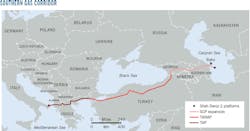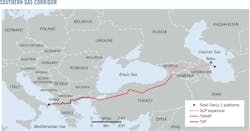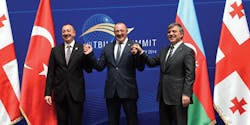NATO developing energy security role
Farid Osmanov
Baku, Azerbaijan
The North Atlantic Treaty Organization (NATO) has begun establishing a separate mechanism for addressing the energy security of its European members. Doing so will not just protect the energy infrastructure critical to their security, but enhance the alliance's general operability and demonstrate its commitment to the region in light of Russia's assertive posture and ongoing threats emanating from the Middle East.
Energy security remains a divisive subject among NATO member states. There is no coherent energy security policy within the alliance or between it and its non-member partner countries. Energy security only officially came under NATO's purview in 2010, with the adoption of the final declaration of the Lisbon Summit and New Strategic Concept.
The strategic concept called on NATO to "develop the capacity to contribute to energy security, including protection of critical energy infrastructure and transit areas and lines, cooperation with partners, and consultations among allies on the basis of strategic assessments and contingency planning."1 But barriers remain, hampering NATO's contribution to energy security and protection of critical energy infrastructure (CEI).
The need for NATO's more active engagement in energy affairs comes most sharply into focus regarding the South Caucasus and Caspian basin. Two pipelines pass through the region: the Baku-Tbilisi-Ceyhan (BTC) oil and Baku-Tbilisi-Erzurum (also known as South Caucasus Pipeline, SCP) gas pipelines.
The Trans-Anatolian Gas Pipeline (TANAP), scheduled for 2018 completion, will carry natural gas from Shah Deniz 2 via Georgia through Turkey to the Trans-Adriatic Pipeline (TAP) on the Turkey-Greece border.
NATO members
The absence of a unified view on energy security among NATO's member states is one of the barriers precluding an enhanced role for the organization in energy affairs and protection of CEI.
Energy security was traditionally regarded as an issue to be dealt with separately by each of NATO's 28 members.Variations in each country's definition of CEI reflect the divergent interests of each member. Some countries regard energy security and protection of CEI as central to national security. Others give it lower priority, energy insecurity not presenting an immediate threat to overall security.
In the special report of the NATO Parliamentary Assembly on energy security, CEI is generally referred to as "those facilities and services that are vital to the basic operations of a given society, or those without which the functioning of a given society would be greatly impaired."2
For Eastern European countries striving to reduce energy dependence on Russia, diversification of supplies and protection of any alternative routes' infrastructure is essential. Other countries, reliant on supplies from other geographic areas, have different priorities. Spain and Portugal, for example, are more interested in securing the maritime routes through which LNG and oil pass. They would also advocate for devotion of NATO resources to securing the Maghreb-Europe or Medgaz pipelines rather than those in the eastern part of the alliance.
CEI reflects the priorities and interests of each alliance member. But reaching a consensus on the role of energy security for the alliance as a whole and finding a common definition for CEI is crucial in formulating well-defined policy.
Military-economic discrepancy
NATO members have traditionally treated energy as an economic matter standing outside military concerns. But given energy security's interregional context it is very important that a public-private synergy develop to address energy security under NATO's umbrella, cutting across the borders of member countries tied to each other with CEI such as pipelines.
The tight interconnectedness of energy and politics, and the growing number of cases in which CEI is attacked or threatened, emphasize this need. Over the past few years an average of 500 attacks/year have occurred on energy-related targets worldwide.3
These attacks occurred mostly in non-NATO territory, but many took place in exactly the countries and regions NATO members rely on for their energy supplies (e.g. Nigeria, Colombia, the Gulf of Aden, the Horn of Africa, and Southeast Asia). The BP-operated BTC and SCP pipelines were both attacked in August 2008 during the Russia-Georgia war, resulting in several days of supply disruption. The Kurdistan Workers' Party (PKK) has also targeted these pipelines inside Turkey.
NATO currently cooperates with non-member partner countries regarding best practices in area-of-consequence management, disaster management, civil emergency planning, and other related topics. The alliance has also conducted anti-piracy operations in the Indian Ocean as part of operations such as Operation Active Endeavour, Operation Active Provider, Operation Allied Protector, and Operation Ocean Shield, deterring attacks on LNG carriers and oil tankers.3
But such resolute actions by NATO have been occasional and have not establishd adequate preemption and response mechanisms to on-going threats to CEI. Without crafting a clear energy security policy to protect CEI outside its borders, NATO will not be able to ensure undisrupted energy supplies.
Clearer policy on energy security and protection of CEI would also reinforce NATO policy in areas such as cyber security and the fight against terrorism, both of which are increasingly intertwined with energy. But energy security and protection of CEI should be handled as a distinct policy issue to ensure proper attention is paid to developing a universal approach and forging the necessary public-private partnership, both inside NATO and with non-member partner countries.
Recommendations
The past 20 years have demonstrated that the Azerbaijan-Georgia-Turkey axis, through which oil and gas from the Caspian basin is carried to Europe, is committed to mutually beneficial cooperation with the West and NATO in a number of areas, including energy security. This commitment's value is only heightened by the wider region's volatility. NATO's commitment to the region and its greater engagement in energy affairs and protection of CEI is in increasing demand from both sides.
Creating a specific cooperation mechanism in energy with partner countries must be a central element of NATO policy. Current frameworks such as Partnership for Peace (PfP) and IPAP (Individual Partnership Action Plan) are not suited to energy-specific cooperation. A separate framework, wholly devoted to energy issues and including private companies, would be an adequate initial step in securing NATO's energy security.
A new framework must go beyond one-on-one cooperation with individual partner countries and embrace a regional multilateral perspective on energy. It may take the form of a multilateral agreement, declaration, or separate plan of action coupled with a permanent platform for meetings.
The legal basis for physical protection of the pipelines by public authorities is in place in the form intergovernmental agreements and host government agreements between the consortium of companies owning and operating the BTC and SCP pipelines and each state through which the pipelines pass. Article 11 of Azerbaijan's host-government agreement confers the security of pipelines to the state of their location, stipulating that "… the Host Government, at its sole cost and expense, but in regular consultations with the SCP participants, shall use the security forces of the State to provide physical security for the Rights to Land, the Facilities and Persons within the Territory involved in project activities."4
Intergovernmental and host government agreements on TANAP also have a security clause: "... the Host Government shall, consistent with the functions of the State under its National Laws in preserving security within the Territory, exert all lawful and reasonable endeavors to provide the security of the TANAP System and Project Activities in accordance with National Laws."5
The fact that the host government is solely responsible for security and physical protection of the pipelines bodes well for including NATO, the clear initial lines of communication expediting appropriate consultations toward a public-private partnership
NATO-member Turkey would be keen to enhance the organization's role in protecting the pipelines passing through its territory, particularly given its stated foreign and energy policy goal of becoming a regional energy hub. Turkey's cooperation in this regard would help it develop a greater overall role within the alliance. Turkey would also welcome an increased NATO role in light of its strained relations with Russia and renewed PKK activity.
Georgia and Azerbaijan have cooperated with NATO in PfP since 1994. The former openly pronounces its intention to join NATO and has deepened its cooperation with the alliance through the NATO-Georgia Commission created in 2008. The latter cooperates via IPAP and NATO-led military operations such as the International Security Assistance Force's and Resolute Support Mission's deployments to Afghanistan.
Further cooperation between NATO and Georgia through a platform for addressing regional energy issues and protecting CEI is in Georgia's best interest, as it will further advance its Euro-Atlantic aspirations and integration. It will also strengthen the strategic triangle between Azerbaijan, Georgia, and Turkey, as a result of which Georgia enjoys reduced energy prices in exchange for acting as a transit state.
Oil and gas revenues allowed Azerbaijan to pursue a balanced foreign policy between the West and Russia for a long time. Recent inclinations to follow Russia in light of deteriorating relations with the US and EU could be reversed by participating in a NATO-led CEI protection apparatus.
The sharp drop in oil prices will increase Azerbaijan's dependence on Western markets and in turn its need to secure these export routes. The expected 2018 startup of Shah Deniz 2 natural gas field and its export through TANAP and TAP will only heighten this dynamic.
Creation of a distinct platform for energy cooperation will elevate relations between NATO and the Azerbaijan-Georgia-Turkey group of nations and substantially increase the alliance's ability to design individual security agreements with partner countries in the future, as suggested by Bakhtiyar Aslanbayli, vice-president of BP-Azerbaijan.6
References
1. "Strategic Concept for the Defence and Security of the Members of the North Atlantic Treaty Organization," Summit Meeting of NATO Heads of State and Government, Lisbon, Nov. 19-20, 2010.
2. "Energy security: Cooperating to enhance the protection of critical energy infrastructures," Special Report of NATO Parliamentary Assembly, Dec. 8, 2008.
3. Grubliauskas, J., "NATO's energy security agenda," NATO Review Magazine, May 9, 2014.
4. "Host Government Agreement between the Government of the Republic of Azerbaijan and BTC Consortium," Oct. 17, 2000.
5. "Host Government Agreement between the Government of the Republic of Turkey and Trans Anatolian Gas Pipeline Company concerning the Trans Anatolian Natural Gas Pipeline System," June 26, 2012.
6. Aslanbayli, B., "NATO's possible role in the protection of critical energy infrastructure in Azerbaijan," Caucasus International, Vol. 3, No. 3-4, Winter 2014-2015, pp. 133-142.
The author
Farid Osmanov ([email protected]) is a freelance analyst based in Baku, Azerbaijan. He has also served at the Atlantic Council of the US, Dinu Patriciu Eurasia Center; the Ministry of Foreign Affairs of the Republic of Azerbaijan, regional security department; and Khazar University, School of Political Science and International Relations. He earned a BA (2010) with distinction from Baku State University in international relations and an MA (2013) from ADA University (former Azerbaijan Diplomatic Academy) in diplomacy and international affairs. He is also an alumnus of the George C. Marshall Center for Security Studies' program on applied security studies, Garmisch-Partenkirchen, Germany.


